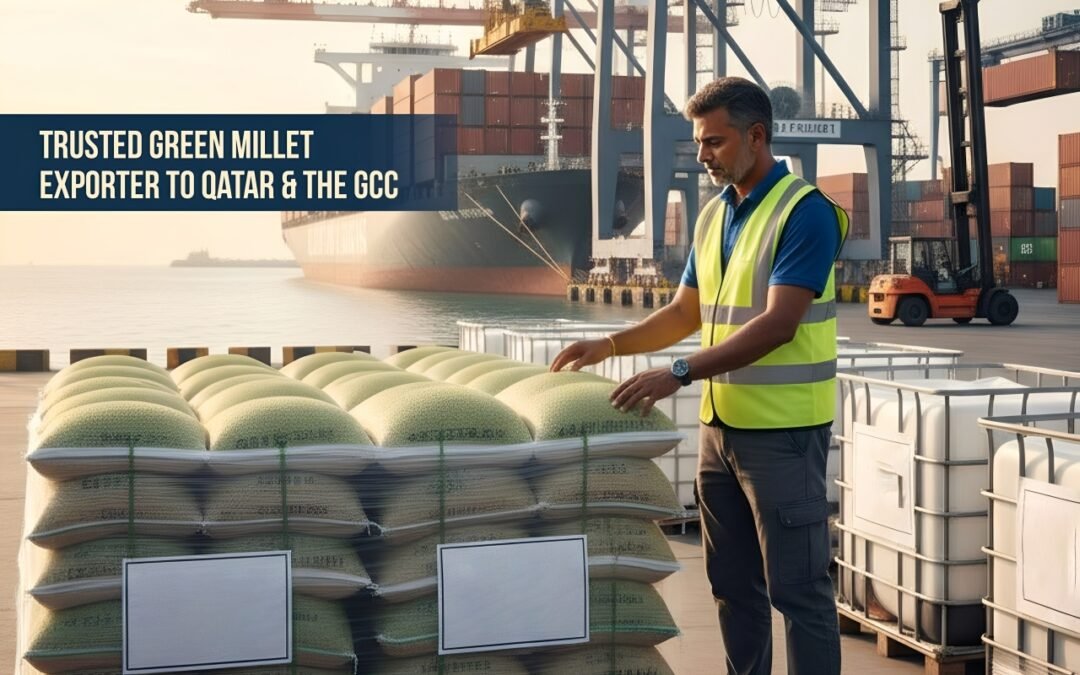The global shift towards healthier, whole-grain diets has positioned millets as a staple of the future. Among these ancient grains, Green Millet, or Bajra, stands out as a nutritional powerhouse. In the dynamic and health-conscious market of Qatar, demand for high-quality Bajra is surging, driven by both expatriate communities and local consumers seeking gluten-free, fiber-rich alternatives.
For businesses in Doha—be it food processors, wholesalers, or large retailers—securing a consistent, high-quality supply from a trusted international exporter is paramount. The journey from farm to fork, crossing continents and navigating stringent regulatory environments, requires more than just a product; it requires a specialized partner. Choosing the right exporter is the difference between a seamless, profitable operation and a supply chain fraught with delays and quality issues.
The Rise of Bajra: Why Qatar is Looking for Green Millet
Green Millet (Bajra) is not just an ancient grain; it’s a superfood making a massive comeback across the globe. Rich in essential minerals like iron, magnesium, and phosphorus, it’s a fantastic source of plant-based protein and dietary fiber. Its low glycemic index makes it a preferred choice for managing blood sugar, aligning perfectly with global health trends now firmly established in the Gulf Cooperation Council (GCC) region, including Qatar.
The traditional Qatari diet is evolving, and while staples remain, there’s a noticeable uptake in imported specialty grains for both home consumption and commercial preparation in hotels and restaurants. This surging market requires exporters who understand not just the product, but the discerning tastes and high standards of the Qatari consumer. A top-tier exporter ensures that every shipment meets a pristine standard, free from contaminants, and maintains its optimal moisture and nutritional profile during transit.
Beyond human consumption, Green Millet (Bajra) is also gaining strong traction in Qatar as a high-performance livestock feed ingredient, particularly valued by feed mills, dairy farms, and poultry integrators. With its balanced nutritional profile—rich in digestible fiber, starch, and 11–14% crude protein—Bajra serves as an economical and sustainable alternative to maize and sorghum in animal diets. Qatari buyers are increasingly sourcing feed-grade millet to improve rumen health in cattle, enhance weight gain in sheep and goats, and support energy-rich rations in poultry. Exporters who specialize in feed-grade millet understand the specific moisture, purity, and grain size standards required for animal nutrition. Combined with proper packaging, phytosanitary certification, and compliance with Qatar’s feed import regulations, Bajra is not just a grain—it’s a reliable solution for enhancing livestock productivity and regional feed security.
Key Pillars of a Reliable Green Millet Supplier to Qatar
Exporting agricultural commodities to Qatar involves a complex matrix of quality control, certification, and logistical finesse. A truly reliable supplier must excel in three core areas:
1. Uncompromising Quality and Sourcing
The quality journey begins at the source. The best exporters maintain direct, transparent relationships with partner farms, often employing stringent screening and processing techniques that begin well before packaging.
- Purity and Cleanliness: Shipments must adhere to strict phytosanitary standards, ensuring the millet is thoroughly cleaned, sorted, and free from foreign matter. This is critical for meeting Qatar’s high import bar.
- Packaging Integrity: Given the hot and often humid transit conditions, the packaging must be robust, food-grade, and designed to preserve the grain’s freshness and prevent pest infestation. Vacuum-sealing or specialized breathable bags are essential for long-haul shipments to Doha’s Hamad Port.
- Certifications: Suppliers must possess relevant international and regional certifications, such as ISO 22000 (Food Safety Management) and specific HACCP protocols. Furthermore, they must comply with all Qatar Ministry of Public Health (MOPH) requirements for food imports.
2. Mastering the Export Documentation and Compliance
Qatar’s import procedures, while streamlined, require meticulous documentation. Any error can lead to costly delays, demurrage charges, or even rejection of the consignment. A reputable exporter acts as a partner, not just a seller, ensuring absolute compliance with Qatari customs.
Key mandatory documents include:
- Commercial Invoice and Packing List: Accurate reflection of goods and value.
- Certificate of Origin: Required for tariff and trade agreement purposes.
- Phytosanitary Certificate: Issued by the exporting country’s relevant authority, confirming the consignment is free from pests and diseases.
- Health/Sanitary Certificate: Mandatory to ensure the grain is fit for human consumption, conforming to the Qatar General Organization for Standards and Metrology (QS).
The ideal supplier has a dedicated compliance team experienced in the specific nuances of the Qatari market, guaranteeing seamless clearance at the port.
3. Efficient and Robust Logistics to Hamad Port
The success of a Green Millet export operation hinges on swift, reliable logistics. Whether shipping by 20-foot or 40-foot containers, choosing the right shipping line and route is critical for maintaining product quality and meeting delivery timelines.
Exporters that specialize in the Middle East trade will:
- Optimize Shipping: Utilize direct and reliable routes to Hamad Port (Doha) to minimize transit time.
- Monitor Temperature: Advise or provide specialized handling to mitigate the risk of high temperatures affecting the grain quality in transit, often using container linings or reefer containers if necessary.
- Offer Flexible Terms: Provide various shipping terms like FOB (Free on Board) or CIF (Cost, Insurance, and Freight), tailored to the Qatari importer’s preference and risk management strategy.
Partnering for Success: A Focus on Specialized Exporters
When selecting a Green Millet supplier, look for an organization that demonstrates all these capabilities—a firm commitment to quality, deep expertise in export documentation, and established logistical networks.
A company whose operational model is focused on sourcing premium millets and adhering to rigorous international standards is precisely what is needed to guarantee continuous supply and superior quality for the food industry in Doha and across the region. An organization with the professionalism, expertise, and infrastructure, like those whose operational excellence is often showcased by industry leaders (e.g., as exemplified on the reference site https://nutrichfoods.com/), is the ideal choice for minimizing risk and ensuring market access.
Partnering with such a specialized exporter minimizes risk, reduces supply chain complexity, and ensures that your Qatari clientele receive the finest, most nutritionally dense Green Millet available. From bulk grain for milling to specialized, packaged retail products, choosing the right supplier is the crucial first step to success in Qatar’s flourishing health food market.

